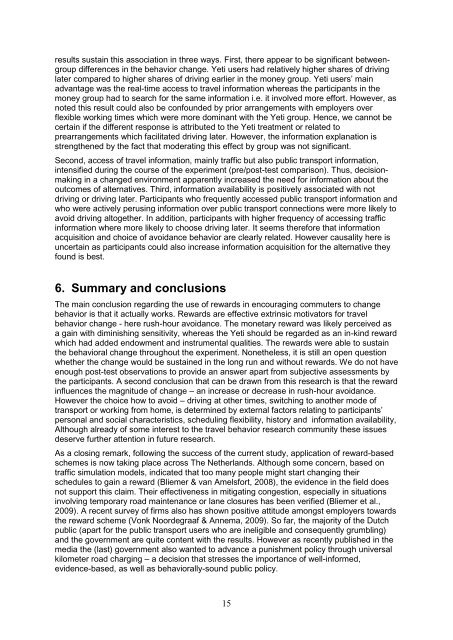Ben-Elia, E. and Ettema, D. (2011) Changing commuters' behav- ior ...
Ben-Elia, E. and Ettema, D. (2011) Changing commuters' behav- ior ...
Ben-Elia, E. and Ettema, D. (2011) Changing commuters' behav- ior ...
You also want an ePaper? Increase the reach of your titles
YUMPU automatically turns print PDFs into web optimized ePapers that Google loves.
esults sustain this association in three ways. First, there appear to be significant betweengroup<br />
differences in the <strong>behav</strong><strong>ior</strong> change. Yeti users had relatively higher shares of driving<br />
later compared to higher shares of driving earlier in the money group. Yeti users’ main<br />
advantage was the real-time access to travel information whereas the participants in the<br />
money group had to search for the same information i.e. it involved more effort. However, as<br />
noted this result could also be confounded by pr<strong>ior</strong> arrangements with employers over<br />
flexible working times which were more dominant with the Yeti group. Hence, we cannot be<br />
certain if the different response is attributed to the Yeti treatment or related to<br />
prearrangements which facilitated driving later. However, the information explanation is<br />
strengthened by the fact that moderating this effect by group was not significant.<br />
Second, access of travel information, mainly traffic but also public transport information,<br />
intensified during the course of the experiment (pre/post-test comparison). Thus, decisionmaking<br />
in a changed environment apparently increased the need for information about the<br />
outcomes of alternatives. Third, information availability is positively associated with not<br />
driving or driving later. Participants who frequently accessed public transport information <strong>and</strong><br />
who were actively perusing information over public transport connections were more likely to<br />
avoid driving altogether. In addition, participants with higher frequency of accessing traffic<br />
information where more likely to choose driving later. It seems therefore that information<br />
acquisition <strong>and</strong> choice of avoidance <strong>behav</strong><strong>ior</strong> are clearly related. However causality here is<br />
uncertain as participants could also increase information acquisition for the alternative they<br />
found is best.<br />
6. Summary <strong>and</strong> conclusions<br />
The main conclusion regarding the use of rewards in encouraging commuters to change<br />
<strong>behav</strong><strong>ior</strong> is that it actually works. Rewards are effective extrinsic motivators for travel<br />
<strong>behav</strong><strong>ior</strong> change - here rush-hour avoidance. The monetary reward was likely perceived as<br />
a gain with diminishing sensitivity, whereas the Yeti should be regarded as an in-kind reward<br />
which had added endowment <strong>and</strong> instrumental qualities. The rewards were able to sustain<br />
the <strong>behav</strong><strong>ior</strong>al change throughout the experiment. Nonetheless, it is still an open question<br />
whether the change would be sustained in the long run <strong>and</strong> without rewards. We do not have<br />
enough post-test observations to provide an answer apart from subjective assessments by<br />
the participants. A second conclusion that can be drawn from this research is that the reward<br />
influences the magnitude of change – an increase or decrease in rush-hour avoidance.<br />
However the choice how to avoid – driving at other times, switching to another mode of<br />
transport or working from home, is determined by external factors relating to participants’<br />
personal <strong>and</strong> social characteristics, scheduling flexibility, history <strong>and</strong> information availability,<br />
Although already of some interest to the travel <strong>behav</strong><strong>ior</strong> research community these issues<br />
deserve further attention in future research.<br />
As a closing remark, following the success of the current study, application of reward-based<br />
schemes is now taking place across The Netherl<strong>and</strong>s. Although some concern, based on<br />
traffic simulation models, indicated that too many people might start changing their<br />
schedules to gain a reward (Bliemer & van Amelsfort, 2008), the evidence in the field does<br />
not support this claim. Their effectiveness in mitigating congestion, especially in situations<br />
involving temporary road maintenance or lane closures has been verified (Bliemer et al.,<br />
2009). A recent survey of firms also has shown positive attitude amongst employers towards<br />
the reward scheme (Vonk Noordegraaf & Annema, 2009). So far, the majority of the Dutch<br />
public (apart for the public transport users who are ineligible <strong>and</strong> consequently grumbling)<br />
<strong>and</strong> the government are quite content with the results. However as recently published in the<br />
media the (last) government also wanted to advance a punishment policy through universal<br />
kilometer road charging – a decision that stresses the importance of well-informed,<br />
evidence-based, as well as <strong>behav</strong><strong>ior</strong>ally-sound public policy.<br />
15

















